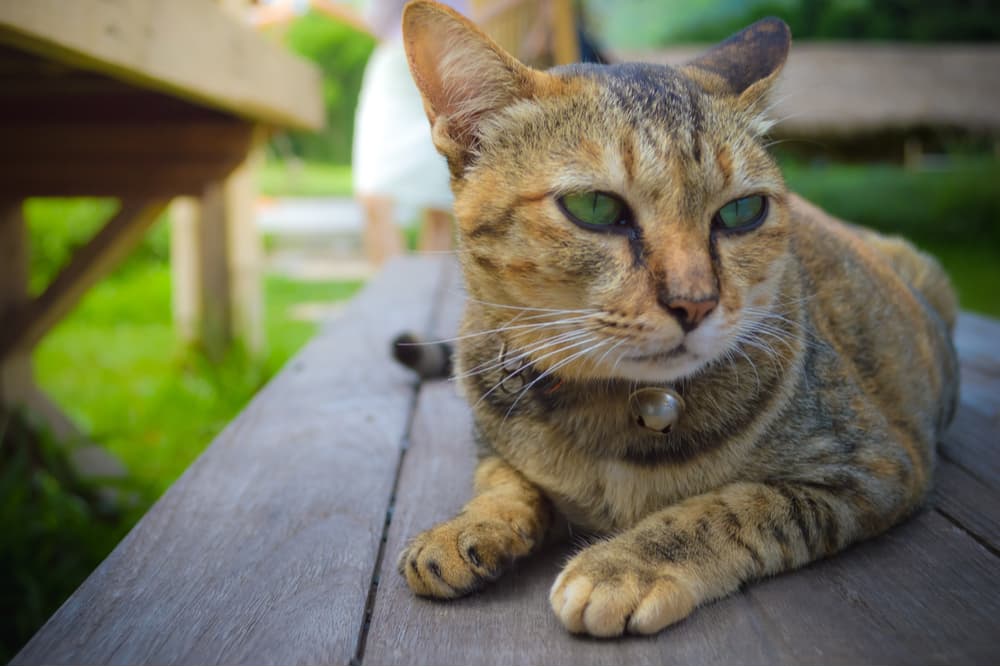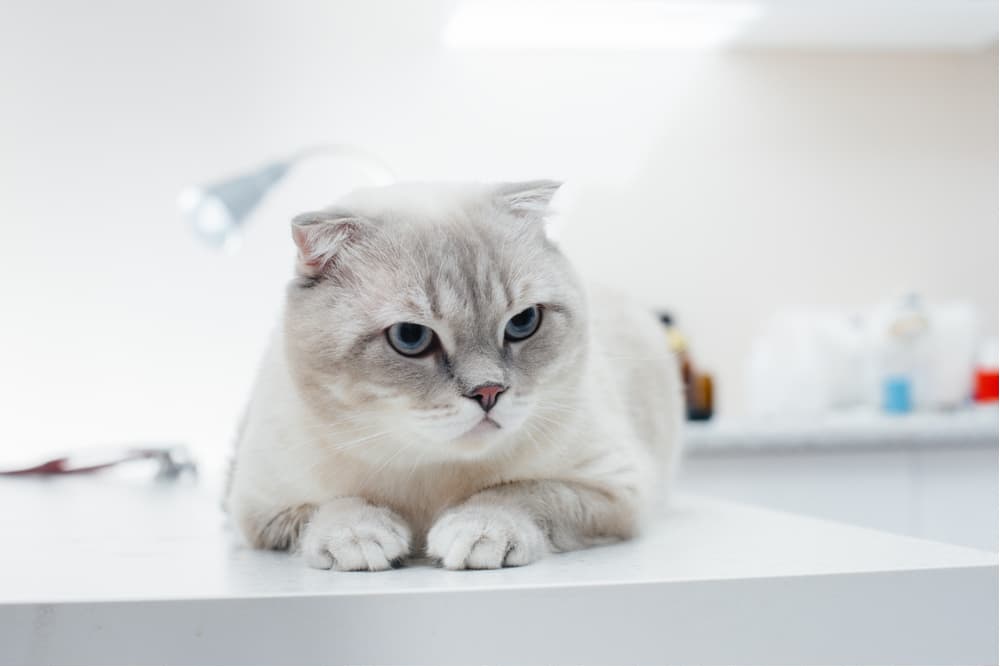All About Feline Asthma

Overview
- Cats can definitely have asthma and for cats, this is a lifelong condition once it is diagnosed
- The most common symptom cats is coughing. Cats rarely cough, and asthma is a typical reason.
- If you suspect your cat is having an asthma attack, call your veterinarian immediately.
- Cats with asthma are usually diagnosed based on history, a physical exam and most importantly X-rays.
- Treatment for a cat asthma attack involves emergency care and fast-acting medications to open airways.
Found in 1 percent of all cats, asthma is a serious condition that—without treatment—can get worse with time.
Asthma attacks in cats can result in a life-threatening situation for our feline companions. While this condition is concerning, attentive pet parents can lower the chance of a full-blown attack if they notice subtle signs first.
Read on to know what symptoms to watch for, what causes feline asthma, and how cats with this condition are treated.
Can Cats Have Asthma?

Cats can definitely have asthma. Most veterinarians call it chronic allergic bronchitis in cats, because that phrase is a better descriptor of the disease. Chronic means ongoing—and for cats, this is a lifelong condition once it is diagnosed. Allergic means that this disease is caused by the body’s immune system overreacting to things it doesn’t like, such as cigarette smoke or dust. Bronchitis means inflammation of the small airways inside the lungs.
Asthma in cats is a similar condition to humans. Your cat’s body has a unique trigger, or allergen. This allergen sets off a chain reaction inside your cat’s lungs that results in constricted airways and an increase in mucus. For these reasons, it becomes difficult to breathe.
In some cats with asthma, they show subtle symptoms for a period of time before pet parents realize something is amiss. In other cats, they very suddenly experience an asthma attack. Each cat is unique in what triggers the issue, and how severe the asthma can be.
Causes of Feline Asthma

Asthma is caused by a cat’s immune system overreacting to allergens, or things that your cat breathes in that the body doesn’t like. Siamese cats are more likely to get asthma, with an occurrence of 5 percent. Besides this specific breed, there is no way to predict which cat will have asthma and which will not.
Allergens that have been identified as causes of asthma in cats include:
- Dust
- Cigarette smoke
- Mold
- Plants (weeds, trees, pollen, etc.)
- Parasites (i.e. lungworms)
- Cat litter
- Household chemicals (i.e. cleaning solutions)
Cat Asthma Symptoms

Most of the time, your cat’s symptoms are chronic or ongoing — they never go away and can be subtle or be pretty obvious. About ¼ of the time your cat’s symptoms are intermittent — the symptoms come and go, and it can be hard to predict when they will come back. It is important that all pet parents recognize these symptoms and monitor their cats closely, even if symptoms go away.
The most common symptom of asthma in cats is coughing. Cats rarely cough, and asthma is a typical reason—especially in a young or middle-aged cat.
Pet parents may also notice ongoing or intermittent signs such as:
- Noise (whistle, wheeze or congestion) when breathing
- Increased rate of breathing (perhaps only occasionally after exercise)
- Decreased activity or your cat stops exercise sooner than usual
- Change in behavior
When cats experience an asthma attack, the symptoms are much more obvious and your cat needs emergency medical attention. Symptoms of a feline asthma attack include:
- Audible noises when breathing (whistle, wheeze, congestion)
- Complete lack of activity and appetite
- Dramatic increased rate of breathing (>1 breath per second)
- Chest moves in and out dramatically with the belly too
- Open mouth breathing (“panting”)
What to Do During a Cat Asthma Attack

If you suspect your cat is having an asthma attack, take the following steps:
Step 1: If you are uncertain as to whether or not your cat is having an asthma attack, call your veterinarian. If they are closed, it is better to visit the emergency room than wait.
Step 2: Reduce your cat’s stress as much as possible. Place him into a carrier gently, coaxing him instead of pushing him in. Keep the carrier covered with a light breathable covering such as a pillowcase or towel. Keep the environment quiet while bringing him to an emergency clinic.
Step 3: Bring your cat to the nearest emergency hospital. Bring any medications he is currently on and report any symptoms that occurred before the asthma attack.
Step 4: If possible, call the emergency clinic while you are on your way to alert them that your cat is having trouble breathing. If this is not possible, the hospital will still tend to your cat swiftly.
Diagnosing Cats with Asthma

Cats with asthma are usually diagnosed based on history, a physical exam and most importantly X-rays. However, X-rays of a cat’s chest can be deceiving. Almost half of cats with asthma have very mild or even no signs on X-rays. But the majority (93 percent) have some change that is noticeable when images are reviewed by veterinarians. This is the best test to see what is happening in the lungs.
Your veterinarian will likely also perform other tests to rule out other possible causes of breathing problems in your cat. One cause could be lungworms, which require a special feces (poop) test to look for lungworm eggs. Bloodwork will likely be performed to evaluate how organs such as the kidneys and liver are doing and look for signs of inflammation.
An uncommon test that your veterinarian may perform is called bronchoalveolar lavage. This procedure involves putting sterile saline (a non-harmful fluid) into the lungs in a small amount, then sucking the fluid back out to be tested. This is more often done when an infection is suspected, or your cat is not responding to treatment very well.
It can be incredibly challenging to tell the difference between cats in heart failure and those having an asthma attack. Because the symptoms are similar, a cardiologist (heart specialist for cats and dogs) may examine your pet for heart disease with an echocardiogram, or measurement of the heart with ultrasound.
Feline Asthma Treatment

Treatment for a cat asthma attack involves emergency care, including oxygen and fast-acting medications to open the airways so your cat can breathe.
When treating your cat for asthma long-term, medication to decrease the inflammation in the lungs is important even if your cat does not always experience symptoms. Over time the inflammation in the lungs (even if mild) can cause permanent damage, so treatment is always warranted.
Medications to Treat Cat Asthma
Long-term medications to treat asthma in cats involve decreasing inflammation in the lungs. Your veterinarian may recommend:
Oral steroids (given by mouth): These medications are usually the first medication prescribed to cats after an asthma attack. Your cat will start out with a strong dose, and slowly decrease the dose to a level safer for long-term use. A common example is prednisolone.
Inhaled steroids: These medications are placed through an inhaler, which is connected to a system made especially for cats. Many cats can be acclimated to this inhaler, which looks like a small clear face mask. It may be safer than oral steroids for certain cats. A common example is fluticasone propionate.
Bronchodilators (given by mouth or inhaler): Occasionally cats that do not respond well to just steroids may also be given this medication, which directly acts on the airway to open it up. A common (by mouth) example is terbutaline.
Immunosuppressants (given by mouth): Occasionally cats that cannot be given steroids may be managed on this, which decreases the entire immune system including in the lungs. An example is cyclosporine.
Home Remedies for Cat Asthma

Holistic therapy is a safe therapy along with Western medicine, but holistic therapy itself will not be enough for your asthmatic cat.
Some examples of supplemental home remedies for cat asthma include:
- High-quality diet
- Acupuncture
- Herbal therapies (veterinary or Chinese)
There is no single herbal therapy that treats asthma in cats. Holistic veterinarians must examine each cat with asthma before prescribing a specific herbal or home remedy, as asthma is complex.
General Cost to Treat Asthma in Cats
If your cat is diagnosed with asthma but is not currently in an emergency situation, the cost for treatment could be anywhere from $400 to $600, depending on what kind of testing is required to determine a cause. Your cat may also need long-term medications to treat chronic asthma, which vary in cost.
If your cat experiences an asthma attack and requires emergency care, the cost could be anywhere from $800 to $2,000.
How to Prevent Feline Asthma

While not all cases of cat asthma can be prevented, you can take the following steps to help reduce your cat’s exposure to common allergens:
- Keep your home clean to avoid dust
- Stop any type of smoking in your home where your cat is exposed
- Address mold issues in your home right away
- Have your cat regularly tested for parasites and provide routine deworming
- Choose a low-dust cat litter
- Use a HEPA filter in your furnace and vacuum
- Switch out carpets for hard floor surfaces where possible
- Remove your cat from parts of your home where you are using strong cleaners, and don’t let them back in until the cleaning products have dried and the area has been well ventilated
- Don’t use essential oil diffusers or scented candles around your cat
Discuss with your veterinarian which cleaning solutions are safe to use around your pets, and only use these at the recommended dilutions and do not allow your cat to have direct exposure.









